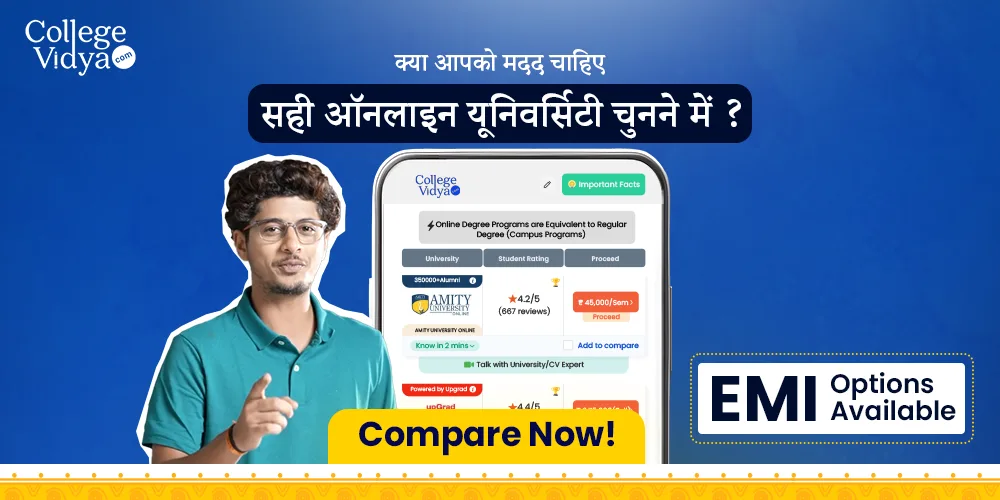Expert Interviews
- University Reviews
- Career Guide
 Video Counseling
Video CounselingImportant Facts
- Ask any Question - CV Forum

After Polytechnic Diploma: Courses, Career Options 2026
College Vidya Team Jan 12, 2026 74.6K Reads

A polytechnic diploma program is a technical and management education program that provides practical skills and training in a specific field of study, such as engineering, computer science, or business. In India, a polytechnic program is typically a diploma-level program that is offered after completing the 10th standard (secondary school) for 3 years or 12th standard (higher secondary school) education for 2 years and 3 years in lateral entry mode.
Upon completion of a polytechnic program, students can pursue further education in the same field by enrolling in an undergraduate program such as B.Tech or BE, or as well as in the MBA also. In addition, learners are allowed to seek employment in the industry as technical professionals and business administration. Polytechnic education in India is a popular option for students who want to gain technical skills and start their careers quickly.
This is because a polytechnic program allows lateral entry admission to a B.Tech, BE and MBA program. All the courses that you can pursue after polytechnic are discussed further in this blog along with the respective career prospects, salary, and other essential factors.
Top Courses After Polytechnic Diploma
Polytechnic diploma programs are designed to equip students with hands-on technical skills, business-related skills, analysis, and knowledge that are required in the industry. These programs' curriculum focuses on practical training and application of concepts rather than theoretical knowledge.

Moreover, several courses can be pursued in engineering and business administration after completing a polytechnic program in India. Some of the popular ones among them are:
- Bachelor of Technology (B.Tech): BTech after diploma is the most popular choice for students who have pursued polytechnic. This is a four-year undergraduate degree program in engineering. However, with a polytechnic in hand, you can get lateral entry admission directly into the second year of the B.Tech program. You can pursue B.Tech in various specializations such as Civil Engineering, Mechanical Engineering, Electrical Engineering, Electronics and Communication Engineering, Computer Science and Engineering, etc.
- Bachelor of Engineering (B.E.): This is also a four-year undergraduate degree program in engineering. The curriculum for B.E. is similar to that of B.Tech and offers similar specializations.
- Bachelor of Science (B.Sc): You can also pursue a Bachelor of Science degree with a focus on engineering, such as a B.Sc in Electronics, B.Sc in Computer Science, or B.Sc in Information Technology.
- Integrated M.Tech: Some universities offer an integrated M.Tech program that combines a B.Tech and M.Tech into a single program. This program usually takes 5 years to complete. Eligibility requirements for this program might be complex, so it is best to visit the university's official website and verify it.
- Master of Business Administration: Students are now allowed to pursue the MBA program after the polytechnic diploma course. This requires a three-year degree program, but if the polytechnic diploma course can be pursued for three years, you are eligible to take admission through an entrance exam; it may vary between universities. Pursuing an MBA after a polytechnic helps in evolving a career in management, leadership, business, or more.
All the above-mentioned courses are regular programs offered in the offline mode. However, if you are a working professional and can not leave your job but still need to complete the education, opt for online education, which is specially designed for learners who aren’t able to attend classes or complete the course on a regular basis, as well as distance learning.
Courses for Working Professionals After Polytechnic Diploma
Pursuing online engineering, business administration, and management courses after completing a polytechnic diploma has recently become a trend because of the industry-driven outcomes. This is because online courses allow you to work alongside studying to gain hands-on practical experience and understanding, which is a much-needed aspect of the field of engineering and business administration.
However, engineering courses are not offered online. Engineering is a technical subject that requires extensive practical learning in addition to theoretical concepts. This is why the government has not allowed universities to offer online engineering programs.
As well as, MBA program can be offered in the both mode which is a subject of learning the essential aspect of practical and theoretical understanding to employ the skills in the real world or real situations. Several universities offer this program online or offline mode.
Your Turn To Answer!
But then, what are online engineering programs and online MBA programs?
To be exact, the government allows working professionals in the field of engineering to pursue higher-level engineering programs in a part-time learning mode which includes a blend of online and offline learning. These programs are under the scheme of Work Integrated Learning Program (WILP).
The online MBA program is a two-year online program that a learner or any working professional can pursue from an authorized university from UGC-DEB and NAAC and a university that accepts polytechnic diploma holders.
B.Tech for Working Professionals after Polytechnic
BTech for Working Professionals are designed to help working professionals who are unable to pursue full-time courses but still want to earn a degree or upgrade their skills. The curriculum is designed to balance theoretical knowledge with practical skills that are required in the industry.
The programs are delivered through a combination of online classes, self-paced learning, and in-person practical sessions. Students have the flexibility to complete the course at their own pace.
The duration of the program is usually four years, but if you pursue B.Tech WILP after completing a polytechnic, you get lateral entry into the second year of the program. So, in this case, the duration is only three years.
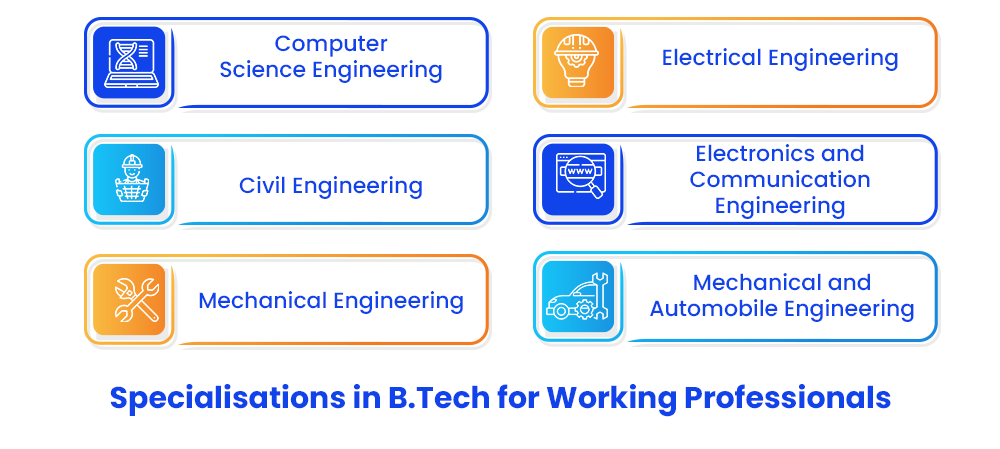
The B.Tech for working professionals course in lateral entry mode can be pursued in several specializations. Some of the popular ones include:
- Computer Science Engineering Lateral Entry
- Civil Engineering Lateral Entry
- Mechanical Engineering Lateral Entry
- Electrical Engineering Lateral Entry
- Electronics and Communication Engineering Lateral Entry
- Mechanical and Automobile Engineering Lateral Entry
MBA for Working Professionals after Polytechnic
MBAs for working professionals are usually forms for working executives who want to continue their study over full-time courses to elevate their skills. However, there is a specialized MBA for working professionals whose curricula are basically designed on the perspective of the learners, offering adequate theoretical and practical knowledge or more emphasis on practical or understanding knowledge to meet up with real-time situations.
This program has one specialization course included and it can offers to the apprentices to opt for two more specializations, which facilitate them in applying over different companies.
The course duration is usually two years or 24 months, but if you continue to pursue the MBA after a polytechnic program, you are eligible to employ lateral entry into this program. Therefore, the course duration is to be 15 months.
The MBA for working professionals course through lateral entry can be sought in 13 specializations and some of them includes:
- MBA in Executive Leadership
- Data Analytics
- Marketing
- Finance
- International Business
- Entrepreneurship
- Human Resources
- General
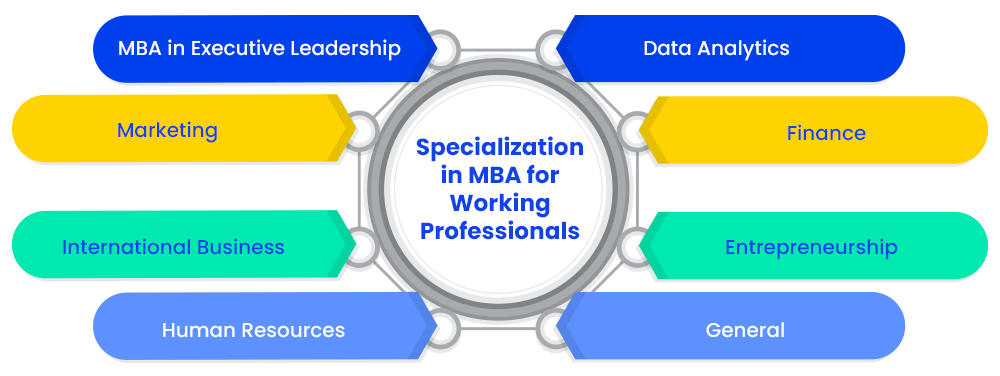
Eligibility of B.Tech Course After Diploma
Online engineering courses have strict conditions of eligibility for admission. This is because it is a special course designed only for working professionals after polytechnic diploma. Given below are the 2 conditions and a student must fulfil them all to get admission to a B.Tech for working professionals course after polytechnic diploma.
- The student must have completed their polytechnic diploma in a relevant stream with at least 50% marks in aggregate and from a recognised higher education institution.
- The student must be a working professional who has at least 2-3 years of experience in a relevant industry.
Eligibility of MBA Course After Diploma
Online business management or administration courses have some conditions or eligibility restrictions for enrolling in them. This course is specialized for learners who pursue it after a polytechnic diploma. So, there are some restrictions that a student must meet to enroll in an MBA after the polytechnic diploma course.
- Have 50% or more marks in the bachelor's degree from a recognized university
- Possessing 12th + 3 years of diploma with 2 years of experience or 10th + 3 years of diploma with 7 years of experience.
- An ephemeral entrance exam for this course is applicable to 12th + 3 years of diploma with less than 2 years of experience or 12th + 2 years of diploma with 5 years of experience, and 10th + 3 years of diploma with less than 7 years of experience or 10th + 2 years of diploma with 5 to 6 years of experience.
Admission Procedure of B.Tech Course After Diploma
The admission procedure to a B.Tech for working professionals program is quite simple as the entire process can be completed online. Following is the detailed stepwise admission procedure for B.Tech for working professionals program.
- Step 1- Visit the official website of the university in which you are taking admission. Be careful to visit the correct website as there are several fake websites out there as well.
- Step 2- Register to the website with your name and contact details after which you will receive your login details.
- Step 3- Log in to the website and then carefully fill up the application form.
- Step 4- Attach the scanned copies of all the required documents.
- Step 5- If any application fee is mentioned, pay it and submit the form. After this you will have to wait for a reply from the university regarding your admission status.
Admission Procedure for MBA Course After Diploma
For enrolling in the MBA program after a polytechnic diploma, there is a process that is accessible online, so, pursue the stepwise admission procedure for the MBA course program; consider it:
- Step 1- Fill out the MBA application form available at the university web page. In addition, there you need to add the appropriate details or documents.
- Step 2- After that check your eligibility for this course and continue to give the entrance exam.
- Step 3- Candidates who are shortlisted for this program as per their work experience, diplomatic program year validity or test obtain the offer letter.
- Step 4- After that, open the offer letter and continue to go for completing the payment section for blocking the seat for this program.
- Step 5- Continue to complete the verification through shared linked by the university.
Fee Structure of B.Tech & MBA Program After Polytechnic Diploma
B.Tech & MBA for working professionals is a highly pocket-friendly program. The fee structure is quite different from that of regular programs. If you pursue B.Tech & MBA for working professionals after the polytechnic, you are eligible for B.Tech and MBA lateral entry, which is for a duration of three years.
In this case, the average fee for the B.Tech complete course is between INR 2,00,000 and INR 3,00,000, while for the MBA course, it is INR 1,60,000. You can pay the fee in four equal installments for each semester.
|
B.Tech Lateral Entry Program and Their Fees |
|
|
University |
Fee per Semester (INR) |
|
Lingayas Vidyapeeth University |
45,000 |
|
Sri Venkateswara University |
36,000 |
|
Sanskriti University |
38,000 |
For more information, readers can click here:
|
You May be Interested |
|
Why Pursue Engineering & Management courses after a Polytechnic diploma?
Pursuing engineering and management programs after completing a polytechnic diploma can be advantageous in many ways. A polytechnic diploma followed by an engineering and administration degree opens up more opportunities for you in your specified field because both qualifications together give you a more profound knowledge of the subject.
This enhances your chances for better and higher-level career opportunities. But here we are talking about online engineering and management, which adds to the advantages of pursuing engineering & MBA courses after a polytechnic diploma.
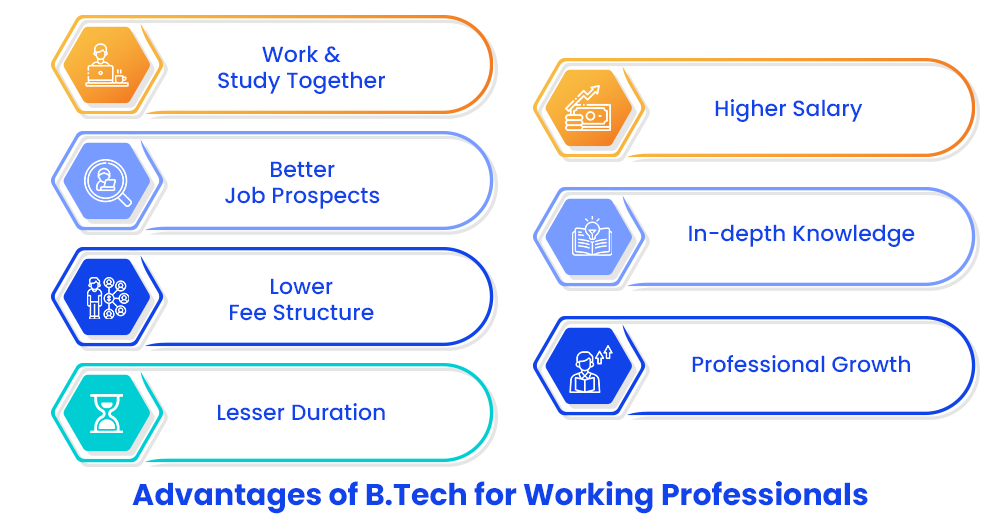
Here are some of the significant benefits of pursuing online engineering & MBA after polytechnic:
- Work & Study Together- The greatest advantage of pursuing online programs after polytechnic is that you can pursue the degree and a job at the same time. The B.Tech & MBA for working professionals course is specifically designed for people who wish to pursue a higher degree but can not leave their jobs. You are able to gain knowledge and experience at the same time, which is something that gives you quite an edge over your competitors.
- Better Job Prospects- A degree in engineering and business administration and a polytechnic diploma can open up many job opportunities in various sectors. With a degree in both management & BTech, you can apply for higher-level positions in companies, which can come with better pay and more responsibility.
- Lower Fee Structure- One of the best parts about online learning is that it is pocket-friendly. The fee structure for B.Tech and MBA programs is much cheaper than that of regular programs.
- Lesser Duration- After completing a polytechnic program, you are eligible for lateral admission to engineering and management degree programs. This means you directly get admission in the second year without completing a bachelor's in the course. And so, you have to study the course for just 3 years or 15 months instead of the standard 4 years.
- Higher Salary- Both engineering and MBA degrees can lead to a higher salary compared to a polytechnic diploma alone. Employers generally offer better salaries to them as they have more advanced knowledge and skills.
- In-depth Knowledge- Engineering and Business Administration courses offer in-depth knowledge of the subject, which can help you gain a deeper understanding of the field you are interested in. This can also help you to specialise in a particular area of engineering and management and increase your knowledge and expertise in that area.
- Professional Growth- Pursuing engineering and management after polytechnic can help you grow professionally and lead to better career prospects. With an engineering and business administration degree, you can pursue higher education and research opportunities, which can lead to new and exciting opportunities.
Overall, pursuing engineering and management after completing a polytechnic diploma can provide you with a range of benefits, including better job prospects, higher salaries, in-depth knowledge, and professional growth.
Best Colleges of B.Tech Engineering After Polytechnic Diploma
Some of the top universities that offer B.Tech lateral entry to students with a polytechnic diploma for the B.Tech for working professionals program.:

|
Engineering Course Name |
Fees Structure |
|
B.Tech In Civil Engineering |
(45000+4000) INR Per Semester+ INR 5000/- One Time |
|
B.Tech In Computer Science Engineering |
(45000+4000) INR Per Semester+ INR 5000/- One Time |
|
B.Tech In Mechanical engineering |
(45000+4000) INR Per Semester+ INR 5000/- One Time |
|
B.Tech In Mechanical Automobile Engineering |
(45000+4000) INR Per Semester+ INR 5000/- One Time |
|
B.Tech In Electronics and Communication Engineering |
(45000+4000) INR Per Semester+ INR 5000/- One Time |
|
Engineering Course Name |
Fees Structure |
|
B.Tech In Civil Engineering |
INR 36000 Per Semester |
|
B.Tech In Computer Science Engineering |
INR 36000 Per Semester |
|
B.Tech In Mechanical engineering |
INR 36000 Per Semester |
|
B.Tech In Electrical Engineering |
INR 36000 Per Semester |
|
B.Tech In Electronics and Communication Engineering |
INR 36000 Per Semester |
|
Sanskriti University |
|
|
Engineering Course Name |
Fees Structure |
|
B.Tech In Civil Engineering |
INR 38,000 Per Semester |
|
B.Tech In Electrical Engineering |
INR 38,000 Per Semester |
|
B.Tech In Mechanical engineering |
INR 38,000 Per Semester |
Best College for MBA Courses after Polytechnic
There is a university (Woolf University) which offers the MBA degree course after polytechnic program which can be enrolled through the lateral entry, view the course and its fees over this university:
|
Woolf University |
|
|
MBA Course Name |
Fees Structure |
|
MBA in Executive Leadership |
INR 1,60,000/- Yearly |
|
MBA in Data Analytics |
INR 1,60,000/- Yearly |
|
MBA in Marketing |
INR 1,60,000/- Yearly |
|
MBA in Finance |
INR 1,60,000/- Yearly |
|
MBA in International Business |
INR 1,60,000/- Yearly |
|
MBA in Entrepreneurship |
INR 1,60,000/- Yearly |
|
MBA in Human Resources |
INR 1,60,000/- Yearly |
|
MBA in General |
INR 1,60,000/- Yearly |
|
MBA in Digital Marketing |
INR 1,60,000/- Yearly |
|
MBA in Product Management |
INR 1,60,000/- Yearly |
|
MBA in Supply Chain Management |
INR 1,60,000/- Yearly |
|
MBA in Healthcare Management |
INR 1,60,000/- Yearly |
|
MBA in Artificial Intelligence & Machine Learning |
INR 1,60,000/- Yearly |
Career Opportunities After Polytechnic Diploma
After pursuing a polytechnic diploma, students have various career opportunities available. They can work in various fields of engineering, such as civil, mechanical, electrical, computer science, electronics and communication, aerospace, and many more. Students also have the option to pursue higher studies and master’s courses like B.Tech, B.E, and B.Sc.
Many government organizations and public sector undertakings (PSUs) hire polytechnic diploma holders in various fields. Some of the popular government jobs for polytechnic diploma holders s include Indian Engineering Services (IES), Defence Research and Development Organisation (DRDO), Bharat Electronics Limited (BEL), and many more.
There are myriad opportunities in the private sector as well. Students can join IT companies, manufacturing companies, construction companies, and many more based on their specialization. Another option for Polytechnic diploma holders is entrepreneurship. They can start their own businesses.
They can use their technical knowledge and skills to start a venture in any field they are interested in. Overall, after completing your polytechnic, you will have a wide range of career opportunities, and students can choose a career path based on their interests and skills.
Consequently, now there has another course; MBA program which the learners can pursue after the polytechnic program, which has different eligibility criteria. However, this course has several future opportunities in brand management, Banking, Marketing Management, Business Analytics, or more.
Job Roles & Salary After Polytechnic Diploma
Various job roles are available for engineering graduates in India, and the salary for each role depends on the company, location, and the individual’s skills and experience. Here are some of the popular job roles and their respective salary ranges:
|
Job Role |
Job Description |
Average Salary Range |
|
Software Engineer |
A software engineer is responsible for designing, developing, and testing software applications. |
INR 6-10 LPA |
|
Mechanical Engineer |
A mechanical engineer designs and develops mechanical systems and products. |
INR 4-8 LPA |
|
Electrical Engineer |
An electrical engineer designs and develops electrical systems and products. |
INR 4-8 LPA |
|
Civil Engineer |
A civil engineer designs and develops infrastructure projects such as roads, bridges, buildings, and water supply systems. |
INR 4-8 LPA |
|
Aerospace Engineer |
An aerospace engineer designs and develops aircraft and spacecraft. |
INR 6-10 LPA |
|
Data Scientist |
A data scientist is responsible for analysing and interpreting complex data to help companies make informed decisions. |
INR 8-15 LPA |
These are just a few examples of job roles available to engineering graduates in India. However, the salary ranges mentioned here are indicative, and actual salaries may vary depending on various factors.
What Is Polytechnic?
Polytechnic programs are post-secondary educational programs that focus on practical skills, technical knowledge, and understanding of business management needed for specific careers or industries. Polytechnic institutions, which are specialized educational institutions that offer a wide range of programs, from certificates and diplomas to undergraduate and postgraduate degrees, typically offer these programs.
Polytechnic programs are designed to provide students with the skills and knowledge they need to enter the workforce in a specific field, such as engineering, applied science, business, hospitality, information technology, management, finance, international business, Human resources, and more. The programs are usually shorter in duration than traditional university degrees, with many programs lasting one to three years.
Polytechnic programs typically emphasize hands-on learning, which can include laboratory work, workshops, real-world analysis, internships, and co-op placements. This allows students to apply their theoretical knowledge in a practical setting, giving them real-world experience and making them more attractive to employers.
Advantages of Polytechnic Diploma
The Polytechnic diplomic course various advantages to the learners who are going to pursue engineering and business administration courses in the future. Therefore, you may continue to read the down prospects:

- Practical Training- Polytechnic programs provide students with practical skills that they can use immediately in the workplace. This makes them highly valued by employers who are looking for graduates with hands-on experience.
- Shorter Duration- Polytechnic programs are often shorter in duration than traditional university degrees, which means that students can enter the workforce sooner and start earning money.
- Industry Connections- Polytechnic institutions often have strong connections to industry, which can provide students with valuable networking opportunities and access to potential employers.
- Lower Cost- Polytechnic programs are often more affordable than traditional university degrees, which makes them accessible to a wider range of students.
Some Popular Polytechnic Programs
There are several disciplines in which you can pursue polytechnic programs. Below mentioned are some of the popular choices of students for polytechnic programs include:
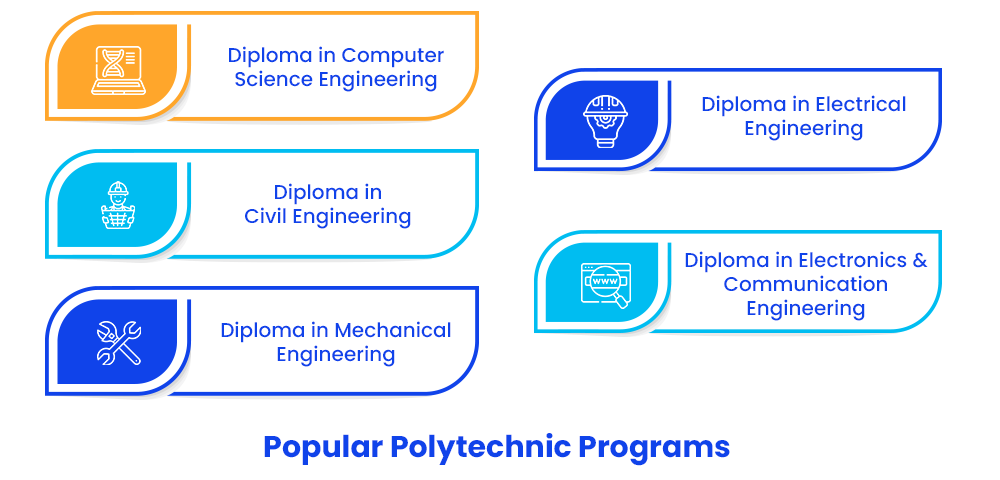
- Diploma in Computer Science Engineering- A polytechnic diploma in computer science engineering is a technical program that provides students with a strong foundation in computer science, programming, and engineering principles. The program typically takes 3 years to complete. The curriculum of the program is designed to provide students with a practical and hands-on approach to learning. This course is a great option for students interested in the field of computer science and engineering and wish to start their careers in this exciting and rapidly growing industry.
- Diploma in Civil Engineering- A polytechnic diploma in civil engineering is a technical program that provides students with a strong foundation in civil engineering principles and practices. Apart from learning the basic civil engineering concepts, the students are also exposed to various software tools used in civil engineering, such as computer-aided design (CAD) and geographic information systems (GIS).
- Diploma in Mechanical Engineering- A polytechnic diploma in mechanical engineering is a 3-year technical program that focuses on training students in the field of mechanical engineering. Students will also gain hands-on experience through laboratory sessions, workshops, and industrial training. The program is designed to equip students with the skills and knowledge necessary to design, manufacture, maintain, and operate mechanical systems and machines.
- Diploma in Electrical Engineering- A polytechnic diploma in electrical engineering is a three-year technical diploma course focused on providing students with in-depth knowledge and skills related to electrical engineering. The course is designed to equip students with the skills required to design, analyse, and maintain various electrical systems and devices. The curriculum includes both theoretical and practical components, with students gaining hands-on experience through laboratory work, industrial training, and project work.
- Diploma in Electronics & Communication Engineering- A polytechnic diploma in electronics and communication engineering is a technical program that prepares students for a career in the field of electronics and communication. The program focuses on the design, development, testing, and maintenance of electronic devices, circuits, and communication systems. The program typically lasts for 3 years and involves both classroom lectures and practical sessions in laboratories. Students are also required to undertake industrial training and projects to gain hands-on experience.
Overall, polytechnic programs offer a practical, hands-on approach to learning that can help students gain the skills and knowledge they need to enter the workforce and pursue successful careers.
Summing Up
To sum up, pursuing a B.Tech and MBA degree for working professionals program can provide individuals with a range of benefits that can enhance their career prospects and lead to more opportunities for growth and advancement. However, this is possible only when you pursue the course from the right university which is approved by the Govt. of India. If you are looking for a university to pursue a B.Tech and MBA for working professionals program, then College Vidya is just the right platform. Here, you get only UGC and AICTE approved universities. You get the added advantages of comparing several universities at the same time at this advanced portal. So wait no more, and get admitted right away!
| Top Trending Articles | |
FAQs (Frequently Asked Questions)
Yes, a polytechnic diploma can be very beneficial and valuable, depending on the field of study and career aspirations of the individual. A polytechnic diploma provides a solid foundation of skills and knowledge that can lead to a fulfilling and successful career.
Pursuing a B.Tech and MBA after polytechnic diploma is one of the best choices as it can be very beneficial in terms of job opportunities.
Usually, an MBA degree can be pursued after completing a bachelor's degree, but now it is accessible after completing a polytechnic program, with some restrictions applicable, and it offers higher job opportunities in the future.
After completing your polytechnic diploma, you have two choices. You can either get an entry-level job in your specified field or pursue a bachelor’s degree in your specialization. B.Tech and MBA after a polytechnic diploma are among the most preferred choices.
Various job roles are available for engineering and business administration graduates in India, and the salary for each role depends on the company, location, and the individual’s skills and experience. Some of the famous job roles in the engineering field are software engineer, data scientist, civil engineer, mechanical engineer, aerospace engineer, and electrical engineer while on the management field there are Finacial analyst, Entrepreneur, Banker, Consulting, Business analyst, strategic manager, or more. The average salary range for them is INR 5-9 LPA.
Applicants can enroll for a B.Tech Lateral Entry/ Flexible Timing program from an approved university. Approved universities that are offering flexible time shift programs are Sanskriti University, Lingaya’s Vidyapeeth University, and SUV.

Idea Alchemist / Concept Creator / Insight Generator
We are an online education platform where users can compare 100+ online universities on 30+ X-factors in just 2 minutes. With an active CV community, we have transformed online learning to quite an extent. With the CV Subsidy scheme, we contributing to GER in India while helping our learners with their finances in their “Chuno Apna Sahi” journey!
Every query is essential.
Our team of experts, or experienced individuals, will answer it within 24 hours.
Recommended for you
Tired of dealing with call centers!
Get a professional advisor for Career!
LIFETIME FREE
Rs.1499(Exclusive offer for today)

Pooja
MBA 7 yrs exp

Sarthak
M.Com 4 yrs exp

Kapil Gupta
MCA 5 yrs exp
or



Career Finder
(Career Suitability Test)
Explore and Find out your Most Suitable Career Path. Get Started with our Career Finder Tool Now!
ROI Calculator
Find out the expected salary, costs, and ROI of your chosen online university with our free calculator.

